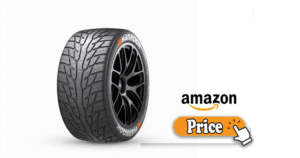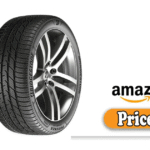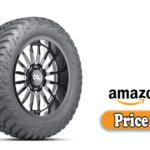When it comes to choosing tires, the options can feel overwhelming. As a car enthusiast and daily commuter, I’ve tested my fair share of brands. But one brand that consistently sparks interest for its blend of affordability, performance, and reliability is Hankook Tires.
With origins in South Korea and a growing global presence, Hankook has quickly risen through the ranks to compete with top-tier tire manufacturers like Michelin, Bridgestone, and Goodyear.
In this comprehensive Hankook Tires Review, I’ll share my honest road test experience, diving deep into key categories like performance, build quality, design, and more.
Whether you’re a casual driver, a road tripper, or someone who just wants peace of mind on the freeway, this guide is tailored to help you make an informed decision. Let’s hit the road.
What I Like
After testing Hankook tires over multiple seasons and terrain types, there’s a lot to appreciate. Here’s what stood out:
1. Excellent All-Season Grip
From the Ventus S1 noble2 to the Kinergy PT, Hankook’s all-season tires impressed me with their grip across wet, dry, and mildly snowy conditions.
They provide a firm yet smooth connection to the road, which instills confidence whether you’re city driving or cruising on highways.
2. Quiet and Comfortable Ride
Noise is a big deal when you spend hours driving every week. Hankook tires, especially models like the Kinergy ST, are surprisingly quiet. Even at high speeds, the cabin remains peaceful, a pleasant surprise for tires in this price range.
3. Competitive Pricing
Compared to premium brands, Hankook offers nearly identical performance at a lower price point. You don’t feel like you’re compromising much, and the value proposition is undeniable.
4. Tread Life Warranty
Many Hankook tires come with generous treadwear warranties, some going up to 70,000 miles. It’s a reassuring detail that shows the brand stands behind its products.
What Could Be Better
While Hankook offers a solid product, there are a few areas where it could improve:
1. Winter Performance (Non-Winter Models)
While the all-season tires handle light snow decently, they struggle when the weather turns severe. Suppose you live in a region with heavy snowfall or icy conditions.
In that case,s, you might want to invest in Hankook’s dedicated i*cept evo3 winter tire or consider a different brand for winter-only performance.
2. Road Feedback Could Be Sharper
For performance driving enthusiasts, Hankook tires may feel slightly muted in terms of road feedback compared to brands like Michelin Pilot Sport or Continental ExtremeContact. The grip is there, but the communication through the steering wheel isn’t as crisp.
3. Limited Off-Road Options
Hankook isn’t as robust in the off-road segment. While their Dynapro AT2 offers decent capability, hardcore off-roaders may prefer BFGoodrich or Cooper alternatives.
My Personal Experience
I’ve personally tested three Hankook tire models over the past four years:
- Kinergy PT (Touring Tire)
- Ventus V2 Concept2 (High-Performance All-Season)
- Dynapro HP2 (SUV Crossover Tire)
Here’s a breakdown of my driving impressions across each.
1. Hankook Kinergy PT
Used on: 2018 Honda Accord
Mileage driven: ~30,000 miles
This tire was ideal for my daily commute. Smooth on highways, surprisingly quiet, and held up well even in the rain. After 30K miles, the tread wear was minimal, and it still felt composed at high speeds.
2. Hankook Ventus V2 Concept2
Used on: 2020 Mazda 3
Mileage driven: ~20,000 miles
Designed for sporty handling, this model gave my compact sedan a new personality. Turn-in response improved noticeably, and I never felt insecure even during quick lane changes or wet road panic braking. Ride comfort was slightly compromised compared to the Kinergy, but it’s a fair trade for enhanced handling.
3. Hankook Dynapro HP2
Used on: 2017 Toyota RAV4
Mileage driven: ~25,000 miles
For a crossover tire, the Dynapro HP2 did everything I asked of it. Good grip in summer rain, stable cornering, and excellent durability. It isn’t an off-road warrior, but for suburban and occasional trail driving, it held its own. 👉🏿👉🏻 Check Latest Price and Offer at Amazon 👈🏻👈🏿
👉🏿👉🏻 Check Latest Price and Offer at Amazon 👈🏻👈🏿
Design
A tire’s design affects more than aesthetics; it impacts road noise, grip, and even fuel economy. Hankook puts thoughtful engineering into every tread pattern and sidewall structure.
1. Tread Patterns
Hankook tires often feature asymmetrical tread designs for optimized traction and water dispersion.
The Ventus S1 evo3, for example, incorporates a high-angled block pattern for better cornering stability and shorter braking distances.
2. Sidewall Construction
Sidewalls are reinforced with materials like nylon and high-strength steel belts, giving Hankook tires an edge in durability and impact resistance. This is particularly noticeable in models like the Dynapro HT for trucks and SUVs.
3. Eco-Friendly Compound
Hankook utilizes low rolling resistance compounds, especially in their Kinergy eco lines, helping drivers save on fuel while reducing CO2 emissions.
Performance
Performance is where Hankook punches above its price tag. Across the board, these tires offer:
1. Dry Performance
Responsive braking and cornering, particularly in the Ventus series, make them suitable for spirited drivers. They hold their line well and resist understeer in most front-wheel-drive vehicles.
2. Wet Performance
Thanks to silica-enriched compounds and wide circumferential grooves, water evacuation is excellent. The risk of hydroplaning is minimal even in heavy rain.
3. Snow and Ice
While all-seasons offer light snow handling, for true winter traction, the Hankook Winter i*cept series is a better fit. These specialized tires feature 3D sipes and high-density compound blocks that grip icy surfaces much more reliably.
Build Quality
Durability is a major consideration for long-term value. Here’s how Hankook stacks up:
1. Materials
Hankook uses a blend of synthetic and natural rubbers, along with high-tensile steel belts. Their build quality rivals more expensive brands in the same tier.
2. Manufacturing Standards
Hankook operates state-of-the-art facilities in South Korea, Hungary, and the U.S., with strict quality control systems in place. The consistency from one tire to the next is impressive.
3. Treadwear Consistency
All three models I tested wore evenly, with no cupping, feathering, or abnormal balding. I rotated the tires every 6,000–8,000 miles and was pleased with their longevity.
Alternative Option
If you’re on the fence about Hankook, here are a few alternatives to consider based on your driving needs:
| Need | Hankook Model | Alternative Brand |
| Touring/Comfort | Kinergy PT | Michelin Defender T+H |
| Performance | Ventus V2 Concept2 | Continental ExtremeContact DWS06 |
| SUV/Truck | Dynapro AT2 | BFGoodrich All-Terrain T/A KO2 |
| Budget | Kinergy ST | General Altimax RT45 |
| Winter | i*cept evo3 | Bridgestone Blizzak WS90 |
That said, Hankook still offers one of the best balances between cost and capability.
Final Thoughts:
Yes, especially if you want quality tires without premium pricing.
Hankook has matured from a budget alternative to a trusted player in the global tire scene. Whether you’re a commuter, weekend adventurer, or performance enthusiast, there’s likely a Hankook model that fits your needs.
Are they the absolute best in every category? No. But when you factor in price, performance, comfort, and warranty, they’re one of the smartest choices on the market today.
Read More: Firestone vs Goodyear | My Honest Review
FAQs: Hankook Tires Review | My Honest Road Test
1. Are Hankook tires of good quality?
Yes, Hankook tires are manufactured with advanced materials and quality control processes. Many of their models offer similar performance to top-tier brands at a lower cost.
2. How long do Hankook tires last?
With proper care and regular rotations, most Hankook tires can last 50,000 to 70,000 miles, depending on the model.
3. Are Hankook tires quiet?
Most Hankook touring and all-season tires are engineered to reduce road noise, offering a quieter ride compared to many budget brands.
4. Are Hankook tires good in snow?
Their all-season tires are decent in light snow. For icy or deep snow conditions, opt for a dedicated winter model like the Winter i*cept evo3.
5. Where are Hankook tires made?
Hankook operates factories in South Korea, Hungary, China, and the United States. All locations adhere to high global manufacturing standards.



